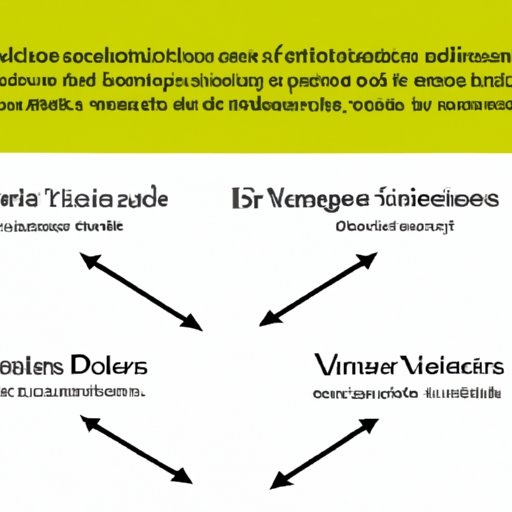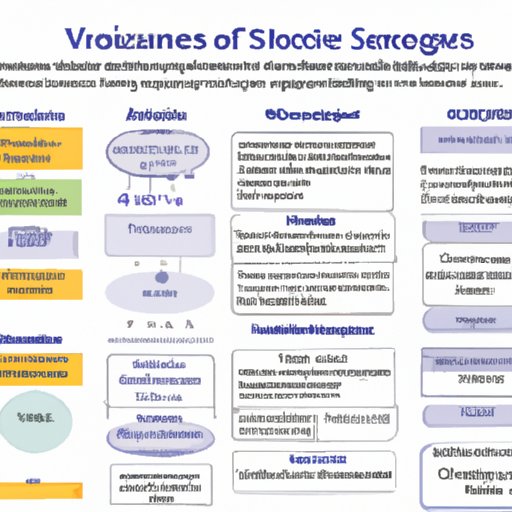Introduction
A variable in science is a factor that can be controlled or changed in an experiment. Variables are essential to scientific research as they allow for measurable outcomes and help researchers understand how different factors interact with each other. By controlling variables, scientists can isolate specific elements of an experiment and determine which factors have the most influence on the results. This article will provide a comprehensive overview of variables in science, exploring their definition, types, uses, and impact.
Explaining Variables in Science: What They Are and How They Work
Variables are an essential element of any scientific experiment. As defined by the Merriam-Webster dictionary, a variable is “a factor, trait, or condition that is capable of being changed or controlled in an experiment, test, or study.” In scientific experiments, variables are divided into two categories: independent variables and dependent variables. Independent variables are those that are manipulated by the researcher and serve as the cause of the experiment, while dependent variables are those that are affected by the manipulation of the independent variable and serve as the effect of the experiment.
For example, in a study examining the effects of temperature on the growth rate of plants, the independent variable would be the temperature and the dependent variable would be the growth rate of the plants. The researcher could manipulate the temperature of the environment and observe the effects on the growth rate of the plants, allowing them to draw conclusions about the relationship between the two variables.

An Introduction to Variables in Science: Defining Their Uses and Purposes
In order to understand the importance of variables in science, it is necessary to explore the different types of variables and their uses. The four main types of variables are independent variables, dependent variables, control variables, and intervening variables. Independent variables are the factors that are manipulated by the researcher, while dependent variables are the factors that are affected by the manipulation of the independent variable. Control variables are those that remain constant throughout the experiment, while intervening variables are those that may affect the outcome of the experiment but are not directly manipulated by the researcher.
For example, in an experiment examining the effects of light intensity on plant growth, the independent variable would be the light intensity, the dependent variable would be the plant growth, the control variable would be the type of plant used, and the intervening variable would be the amount of water given to the plants.

A Guide to Understanding Variables in Science
Understanding the different types of variables and their uses is essential for conducting effective scientific experiments. Variables are used to measure the effects of different factors, allowing researchers to draw conclusions about the relationships between them. For example, in a study examining the effects of temperature on plant growth, the independent variable would be the temperature and the dependent variable would be the growth rate of the plants. By manipulating the temperature and measuring the effects on the growth rate of the plants, the researcher can draw conclusions about the relationship between the two variables.
In addition to understanding the different types of variables and their uses, it is also important to understand the impact of variables on scientific research. Variables allow researchers to isolate specific elements of an experiment and determine which factors have the most influence on the results. By manipulating and controlling variables, researchers can gain valuable insights into the relationships between different factors and draw more accurate conclusions about their experiments.
Variables in Science: An Overview of their Definition, Use and Impact
In order to gain a comprehensive understanding of variables in science, it is important to examine their definition, use, and impact. Variables are an essential element of any scientific experiment as they allow for measurable outcomes and help researchers understand how different factors interact with each other. In scientific experiments, variables are divided into two categories: independent variables and dependent variables. Independent variables are those that are manipulated by the researcher and serve as the cause of the experiment, while dependent variables are those that are affected by the manipulation of the independent variable and serve as the effect of the experiment.
The different types of variables are used for different purposes in scientific experiments. Independent variables are used to measure the effects of different factors, while dependent variables are used to measure the effects of the manipulation of the independent variable. Control variables are used to ensure consistency throughout the experiment, while intervening variables are used to account for any extraneous factors that may affect the outcome of the experiment.
The use of variables in scientific research has a significant impact on the results of experiments. By manipulating and controlling variables, researchers can isolate specific elements of an experiment and determine which factors have the most influence on the results. This allows researchers to gain valuable insights into the relationships between different factors and draw more accurate conclusions about their experiments.

Variables in Science: A Comprehensive Overview
This article has provided a comprehensive overview of variables in science, exploring their definition, types, uses, and impact. Variables are an essential element of any scientific experiment as they allow for measurable outcomes and help researchers understand how different factors interact with each other. Different types of variables are used for different purposes in scientific experiments, and understanding the impact of variables on scientific research is essential for conducting effective experiments.
By manipulating and controlling variables, researchers can gain valuable insights into the relationships between different factors and draw more accurate conclusions about their experiments. Understanding variables in science is essential for conducting effective experiments and drawing meaningful conclusions from the results.
Unpacking Variables in Science: What They Mean and How They’re Used
In order to further understand variables in science, it is important to examine the different types of variables and their uses. Independent variables are those that are manipulated by the researcher and serve as the cause of the experiment, while dependent variables are those that are affected by the manipulation of the independent variable and serve as the effect of the experiment. Control variables are those that remain constant throughout the experiment, while intervening variables are those that may affect the outcome of the experiment but are not directly manipulated by the researcher.
The use of variables in scientific research allows researchers to isolate specific elements of an experiment and determine which factors have the most influence on the results. By manipulating and controlling variables, researchers can gain valuable insights into the relationships between different factors and draw more accurate conclusions about their experiments. Understanding the different types of variables and their uses is essential for conducting effective scientific experiments.
Conclusion
This article has provided a comprehensive overview of variables in science, exploring their definition, types, uses, and impact. Variables are an essential element of any scientific experiment, and understanding the different types of variables and their uses is essential for conducting effective experiments. By manipulating and controlling variables, researchers can gain valuable insights into the relationships between different factors and draw more accurate conclusions about their experiments.
Understanding variables in science is beneficial for conducting effective experiments and drawing meaningful conclusions from the results. With this comprehensive overview of variables in science, researchers can gain a better understanding of their importance and how they can be used to gain valuable insights into the relationships between different factors.
(Note: Is this article not meeting your expectations? Do you have knowledge or insights to share? Unlock new opportunities and expand your reach by joining our authors team. Click Registration to join us and share your expertise with our readers.)
